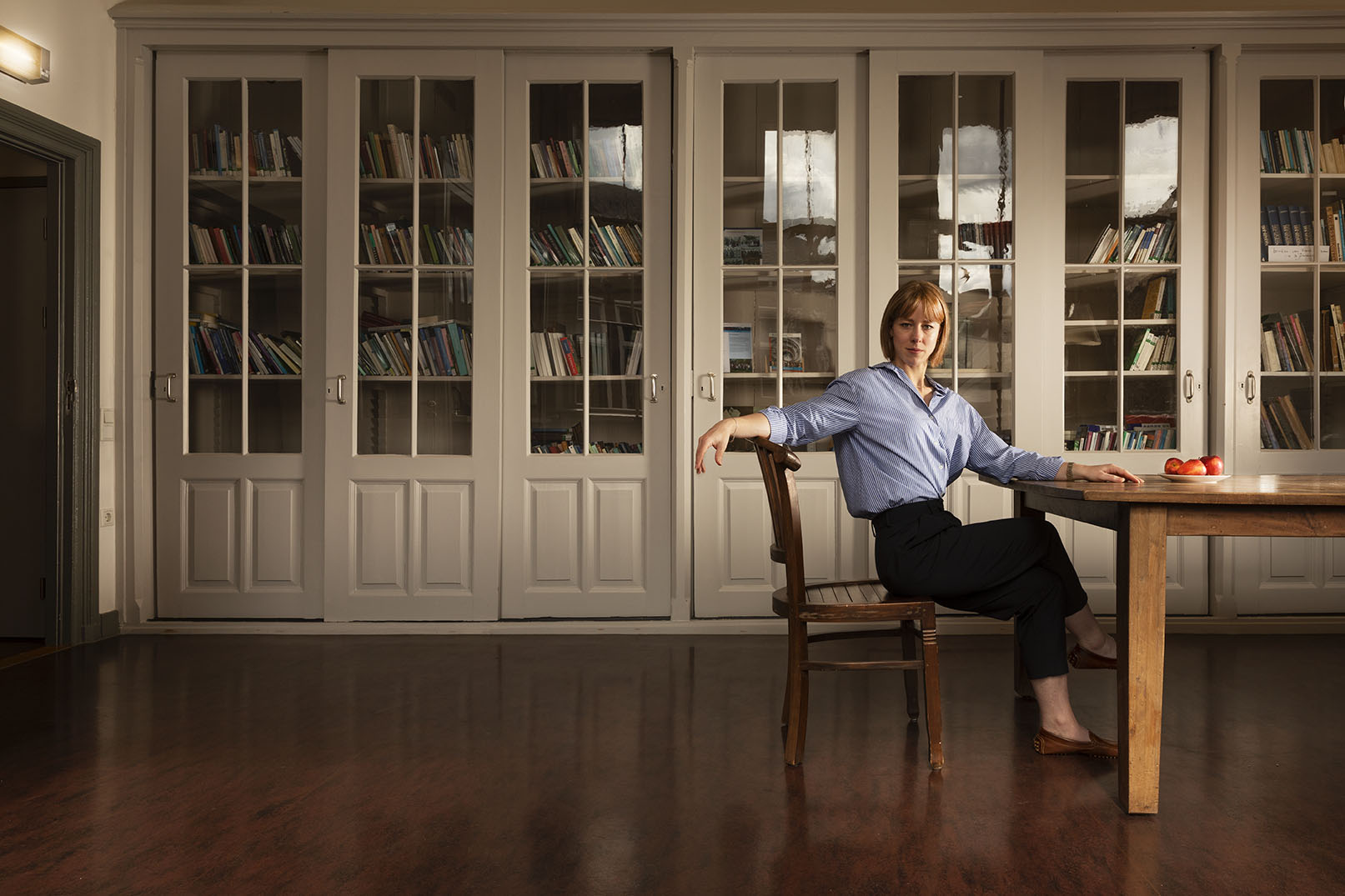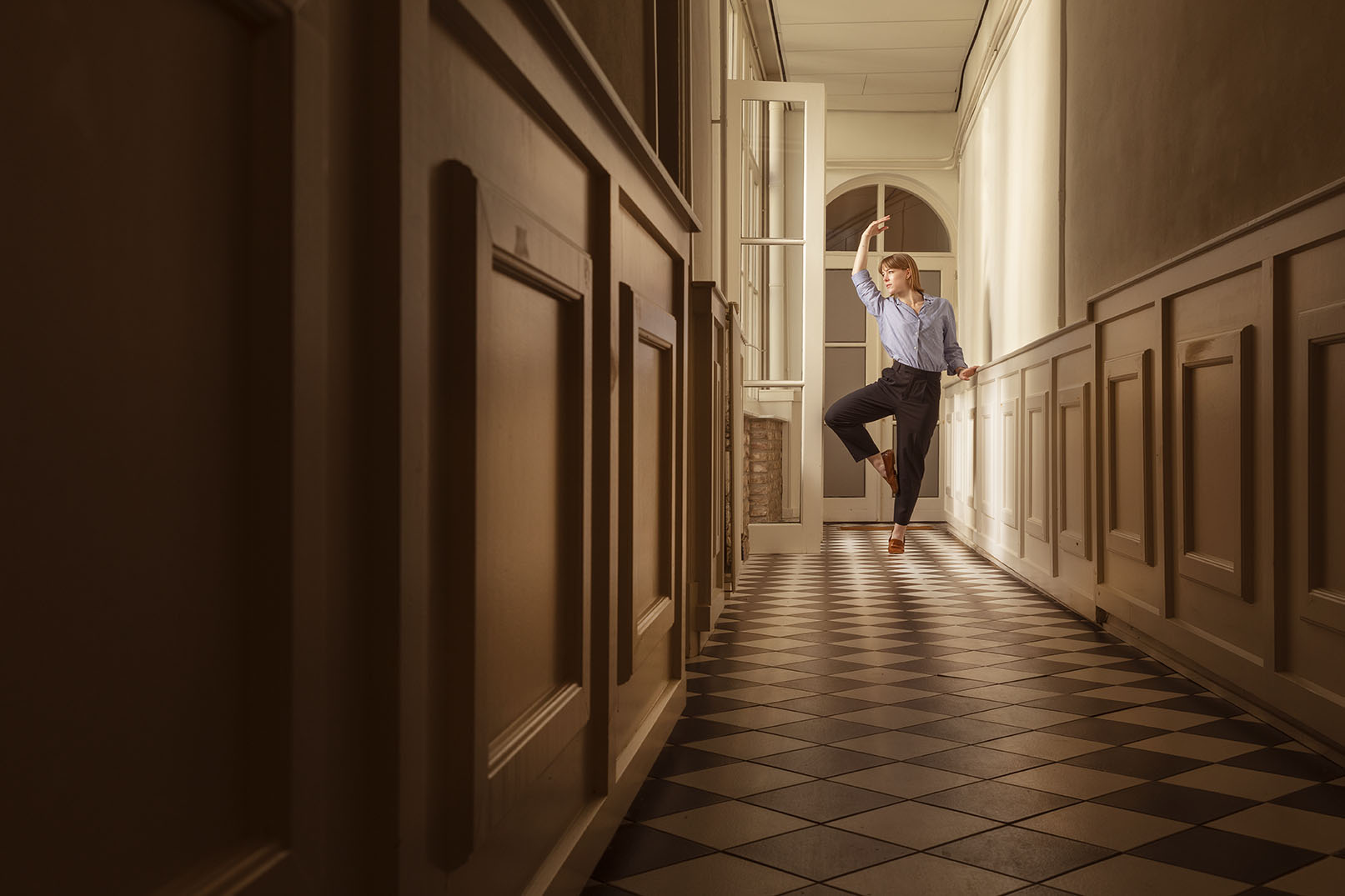Russia: from (quasi-)democracy to dictatorship
Mariëlle Wijermars, assistant professor of Cybersecurity and Politics, knows better than anyone how the Russian propaganda machine works and makes selective use of history. It is a topic she has been researching for years. She was shocked by the invasion of Ukraine and the brutal crackdown on freedom of expression in Russia. “The government is no longer even trying to keep up the appearance of democracy. Russia is fast moving towards a dictatorship. I saw the signs long ago, but hoped it wouldn’t come to that.” Here she discusses the importance of a free press, her first acquaintance with Russia, and the career she never had as a backup dancer for Britney Spears.
The first weeks after Russia’s invasion of Ukraine were intense for Mariëlle Wijermars. She collaborates on a daily basis with Russian and Ukrainian academics, most of them now working abroad. “I was getting messages from co-authors saying, ‘I don’t know if I’ll make that deadline because I’m trying to get my parents to safety.’ Following the events, all these personal stories from my network and the terrible stories I’m hearing about refugees—it’s very emotional.”
The far right becomes mainstream
Wijermars has been tracking the Russian media for years. After her studies in international relations and Slavic languages in Groningen, she obtained her PhD on how the Russian government uses history to legitimise itself and the role the media plays in this process. From 2017 to 2019 she worked in Helsinki as a postdoctoral researcher on a project on press freedom and journalism. “My main focus was on internet freedom and how it was being curtailed. It wasn’t too bad back then, but now it’s completely out of hand. I kept seeing the signs, but you hope it doesn’t happen.”
Press freedom in Russia has long been limited, she says, but the restrictions were previously aimed at certain sensitive topics and specific media and journalists. Now, the censorship is complete: all independent media have been shut down or their websites blocked. Over the past year, most independent journalists and foreign correspondents have left the country.
“The repression of opposition figure Alexei Navalny last year, after his return from Germany, was of a different order. Until then they had tried to keep up the appearance of democracy: you could vote and there was—supposedly—an opposition candidate. Navalny’s political network has since been completely dismantled and the conditions of his imprisonment have been tightened. During the demonstrations against his arrest, an unprecedented number of protestors were arrested with unprecedented violence. Where protestors used to be arrested under the guise of ‘you’re blocking the road’, now they’re simply thrown in jail. We knew the judiciary wasn’t independent, but now not even the semblance of independence is maintained. The regime is rapidly moving towards a dictatorship.
“I’ve spent many hours analysing Russian television, and their legitimisation strategies are also getting tougher. What they’re presenting now are outright lies. They show images of Bucha and claim, ‘that wasn’t us, it was the Ukrainians.’ In my dissertation, I analysed statements by the right-wing nationalists Alexander Dugin and Maxim Kalashnikov from the 2000s as examples of what was then ‘extreme’ thinking in Russian political debate. Now I literally hear their words in the official statements of the Russian government. What were once very extreme views have become mainstream. I find that terrifying.”
- Text continues below the photo -


From music to academia
Her passion for Russia and her research suggests that this is what she always aspired to. Nothing could be farther from the truth. Growing up in Den Bosch as the youngest of three girls, she wasn’t sure what path to pursue. At first it was music: she played the violin from age 6, the piano at 8. And she studied classical ballet. “But I just didn’t have the passion to dedicate my life to the violin. I played classical music, Debussy and the rest, but I also liked R&B. It was the 90s, so I watched a lot of TV too, especially TMF. When I was 16 I wanted to be a professional dancer, like Britney Spears’ backup dancers. I auditioned for one of those Saturday training programmes, but nothing came of it.”
After finishing high school she still had no clear-cut plan, so she opted for the broad-based International Relations. It was only when she took Russian as a minor that the ball started rolling. What began as a minor soon turned into a second degree. “Having to decipher Latin in high school later helped me in learning Russian. I’ve always been interested in language, culture and history.” As a student of Slavic languages, she spent three months in Saint Petersburg in 2011; her first encounter with Russia.
“The first impression was very impressive, it’s a large and beautiful city. The Hermitage was fantastic. And we were there in winter; occasionally it got down to minus 30 degrees. I’d never experienced cold like that. One student from The Hague would wear his grandmother’s fur coat. They found that very strange—men don’t wear fur.”
She was last there in 2018 to conduct interview research. “You try to do it as securely as possible, because there’s a good chance you’ll be tapped. A number of academics I had contact with at the time are currently in a precarious position. Proper research is not viewed favourably right now. Back then my visa was supported by the Higher School of Economics in Moscow, but my host had to submit a report to the representative of the security services at the university; I was a foreigner, after all. So that double layer has been around for many years.”
Erosion of democracy
Her current research topics are of some urgency: how are platforms forced to impose censorship? How do you pressure journalists? How can we guarantee internet freedom? “What happens to the internet in Russia also has an impact abroad; other countries can learn from it. For example, Russia is successfully exerting pressure on foreign social-media platforms. You now see the same tactics being used in Turkey and India, all those countries that have the same goal: curtailing press freedom and freedom of expression.
“It’s ultimately about the erosion of democracy, which is relevant for us too. That’s why I find it so disturbing to see populism emerging here. Because I’ve been involved with Russia for so long, I look differently at public debates here. Press freedom is an essential pillar of democracy, and in recent years distrust of journalists has been growing. People see news as ‘fake’, which concerns me deeply. You also see our politicians struggling to connect with voters, prioritising their own PR and agendas. That doesn’t help, it erodes democracy. Let them be warned.”
Text: Annelotte Huiskes
Photography: Arjen Schmitz
Also read
-
“Politicians are making fewer false promises, but it is still politics after all”
A stop to migration? Setting aside the nitrogen regulations? Radically countering internationalisation in higher education? Politicians regularly make great pronouncements. To what extent are these promises realistic? Dr Karin van Leeuwen, lecturer of European Political History at the Faculty of...

-
How wild are “wild animals” still in the time of zoos, nature reserves and breeding programmes?
Is an elephant in Artis Zoo just as “wild” as an elephant on the African savannah? What place do animals have in a world that is increasingly shaped by humans? Why does the presence of a few wolves in the Netherlands trigger so many negative emotions, while Dutch people donate money en masse to...

-
Why ChatGPT has generated so much hype
While the discourse around ChatGPT has probably started reaching saturation point, it’s worth pointing out how few of these discussions are actually about the chatbot itself. From being too quick to accuse students of cheating, to underestimating what humans can do, to the perils of following the...
